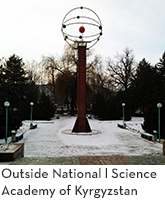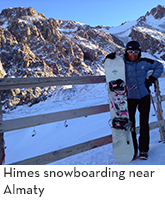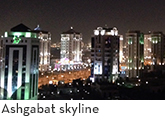CBS alum Katherine Himes is spending the next two years in Central Asia building up the region’s science and technology capacity

|
“The science challenges here are so invigorating,” says Katherine Himes, speaking via Skype from her lodgings in Almaty, Kazakhstan where she recently began an American Association for the Advancement of Science (AAAS) Science and Technology Policy Overseas Fellowship. “This part of the world is experiencing rapid change, and I’m helping their scientists address pressing issues like air pollution, climate change and biodiversity loss.” Himes has a B.S. and a Ph.D. in neuroscience from the U of M and an MBA in entrepreneurship from the University of Wisconsin–Madison. To D.C. and beyondAfter being appointed to the AAAS D.C. fellowship track, Himes served for two years in Washington at the Office of Science & Technology in the U.S. Agency for International Development (USAID). She worked with the Department of State, Smithsonian Institution, U.S. Geological Survey and other federal science agencies. As part of the job, she traveled to Nepal, South Africa, Pakistan, Morocco, France, Turkey and Switzerland, where she worked with the United Nations offices in Geneva. Her new two-year overseas commitment in Kazakhstan, representing USAID’s Central Asian Republics’ Mission, also requires an intense travel schedule. “Next week, I’m headed to Turkmenistan, so that will be the 12th country I’ve visited since I started,” she says. The role of a generalist“Although I have degrees in neuroscience, I’m doing much broader science than for my dissertation, for example, which was to study the development of the nervous system and how hormones affect cell migration,” she says. “Now, to solve major global challenges, I’m using biology, but also a lot of geology and hydrology, too.” She credits the College of Biological Sciences for the “broad foundation” it provided. “I didn’t take just neuroscience classes at the University, but also topics like the history of science, biology and psychology, which are very helpful now that I’m working as a generalist.” The University also provided her with excellent preparation for her current role, in what she calls “an amazing position” as assistant to the provost, which she started after she completed her doctoral coursework. “The position touched so many parts of campus life, and I worked with senior administrators, faculty, students, staff and external audiences.” “That flag looks really good”Himes arrived in Almaty in November. She’s been acclimating to the culture by taking Russian lessons, exploring the surrounding mountains and developing friendships with both locals and expats. A vegetarian, she’s observed with curiosity the hanging tongues displayed at the Green Bazaar – nowhere near the delicious local fruits and vegetables, and cans of horsemeat at the store. Asked what she misses most about home, she cites two things: “First, the clear skies and clean air of Washington, D.C., and second, commuting safely to work on my bicycle.” Her appreciation for her native land has already deepened during her brief time in the post. “During my second or third week here in Kazakhstan, I saw an American flag while on a work trip, and I felt tears well in my eyes. I thought about equal rights, justice, access to education, and all our amazing American liberties, and I said to myself, ‘That flag looks really good.’ It was an emotional experience for me, and certainly one I didn’t expect,” she says. — Julie Kendrick
|


 |